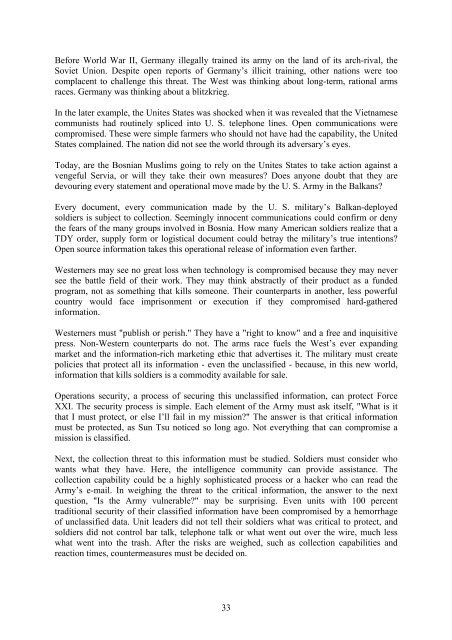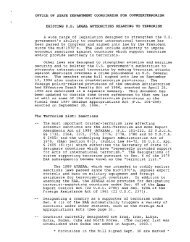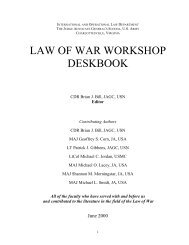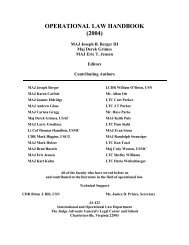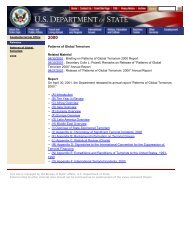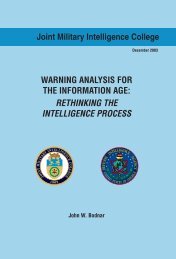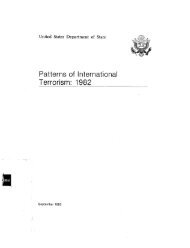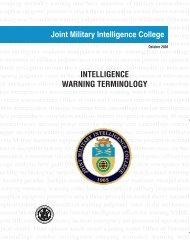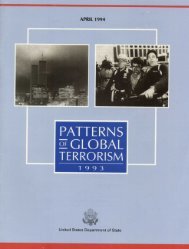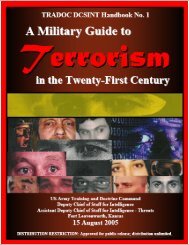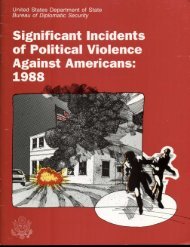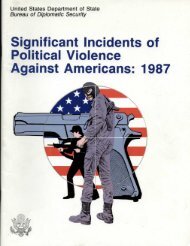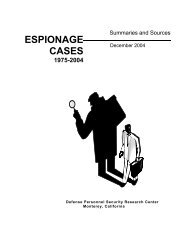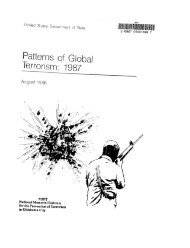OPEN SOURCE INTELLIGENCE - The Challenge for NATO - OSS.net
OPEN SOURCE INTELLIGENCE - The Challenge for NATO - OSS.net
OPEN SOURCE INTELLIGENCE - The Challenge for NATO - OSS.net
Create successful ePaper yourself
Turn your PDF publications into a flip-book with our unique Google optimized e-Paper software.
Be<strong>for</strong>e World War II, Germany illegally trained its army on the land of its arch-rival, the<br />
Soviet Union. Despite open reports of Germany’s illicit training, other nations were too<br />
complacent to challenge this threat. <strong>The</strong> West was thinking about long-term, rational arms<br />
races. Germany was thinking about a blitzkrieg.<br />
In the later example, the Unites States was shocked when it was revealed that the Vietnamese<br />
communists had routinely spliced into U. S. telephone lines. Open communications were<br />
compromised. <strong>The</strong>se were simple farmers who should not have had the capability, the United<br />
States complained. <strong>The</strong> nation did not see the world through its adversary’s eyes.<br />
Today, are the Bosnian Muslims going to rely on the Unites States to take action against a<br />
vengeful Servia, or will they take their own measures? Does anyone doubt that they are<br />
devouring every statement and operational move made by the U. S. Army in the Balkans?<br />
Every document, every communication made by the U. S. military’s Balkan-deployed<br />
soldiers is subject to collection. Seemingly innocent communications could confirm or deny<br />
the fears of the many groups involved in Bosnia. How many American soldiers realize that a<br />
TDY order, supply <strong>for</strong>m or logistical document could betray the military’s true intentions?<br />
Open source in<strong>for</strong>mation takes this operational release of in<strong>for</strong>mation even farther.<br />
Westerners may see no great loss when technology is compromised because they may never<br />
see the battle field of their work. <strong>The</strong>y may think abstractly of their product as a funded<br />
program, not as something that kills someone. <strong>The</strong>ir counterparts in another, less powerful<br />
country would face imprisonment or execution if they compromised hard-gathered<br />
in<strong>for</strong>mation.<br />
Westerners must "publish or perish." <strong>The</strong>y have a "right to know" and a free and inquisitive<br />
press. Non-Western counterparts do not. <strong>The</strong> arms race fuels the West’s ever expanding<br />
market and the in<strong>for</strong>mation-rich marketing ethic that advertises it. <strong>The</strong> military must create<br />
policies that protect all its in<strong>for</strong>mation - even the unclassified - because, in this new world,<br />
in<strong>for</strong>mation that kills soldiers is a commodity available <strong>for</strong> sale.<br />
Operations security, a process of securing this unclassified in<strong>for</strong>mation, can protect Force<br />
XXI. <strong>The</strong> security process is simple. Each element of the Army must ask itself, "What is it<br />
that I must protect, or else I’ll fail in my mission?" <strong>The</strong> answer is that critical in<strong>for</strong>mation<br />
must be protected, as Sun Tsu noticed so long ago. Not everything that can compromise a<br />
mission is classified.<br />
Next, the collection threat to this in<strong>for</strong>mation must be studied. Soldiers must consider who<br />
wants what they have. Here, the intelligence community can provide assistance. <strong>The</strong><br />
collection capability could be a highly sophisticated process or a hacker who can read the<br />
Army’s e-mail. In weighing the threat to the critical in<strong>for</strong>mation, the answer to the next<br />
question, "Is the Army vulnerable?" may be surprising. Even units with 100 percent<br />
traditional security of their classified in<strong>for</strong>mation have been compromised by a hemorrhage<br />
of unclassified data. Unit leaders did not tell their soldiers what was critical to protect, and<br />
soldiers did not control bar talk, telephone talk or what went out over the wire, much less<br />
what went into the trash. After the risks are weighed, such as collection capabilities and<br />
reaction times, countermeasures must be decided on.<br />
33


